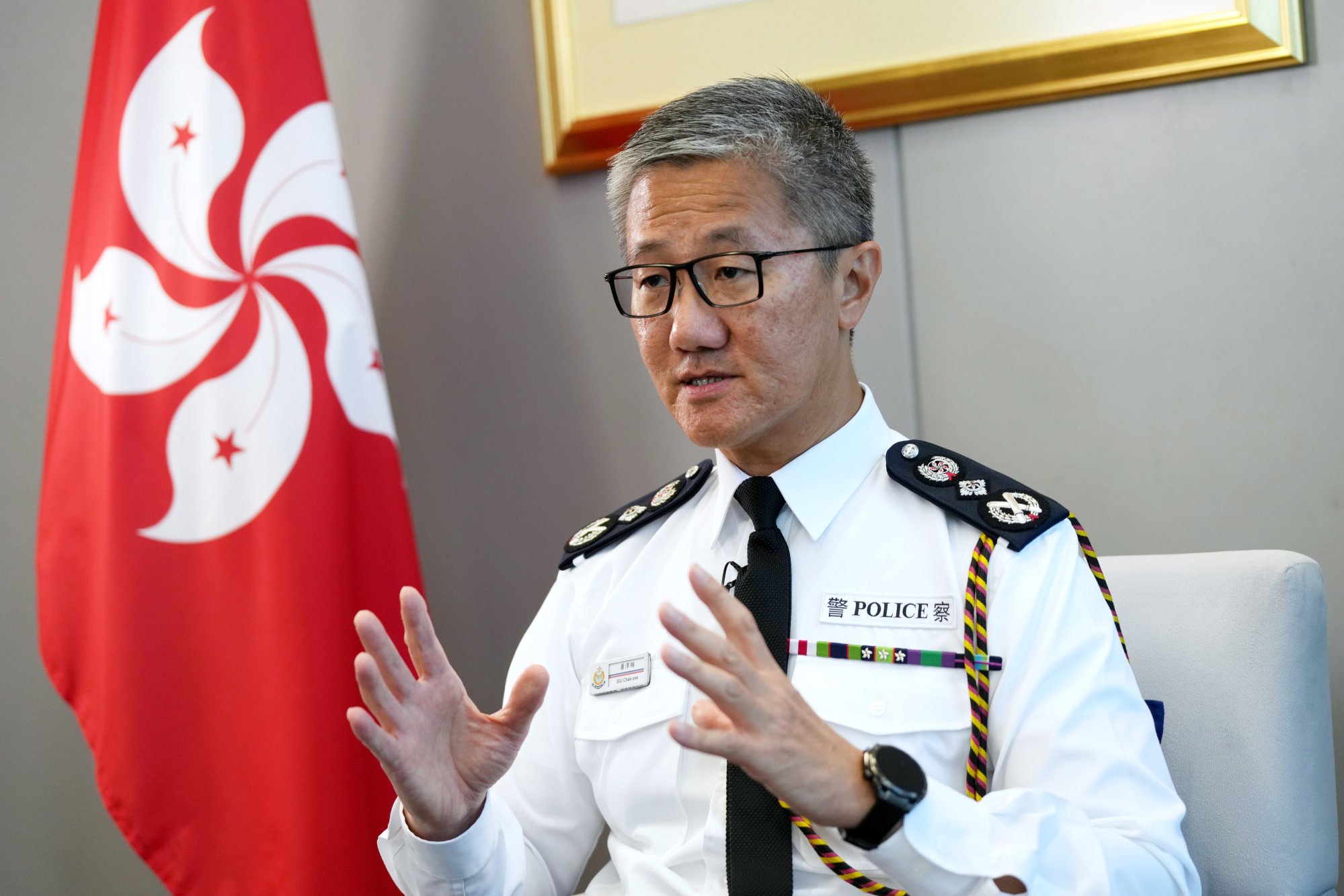Bank users will get pop-up warnings on their ATMs by the end of March when suspected fraudulent transactions occur as Hong Kong doubles down against scams with mounting losses reaching HK$6.41 billion in the first three quarters this year, the police chief has revealed.
In an exclusive interview with the Post this week, Commissioner of Police Raymond Siu Chak-yee also warned that fraud deploying deepfake technology was likely to be the next major form of swindling to plague the city, even as the overall rise in the number of reported scams had slowed.
To ramp up prevention measures, Siu said, warning messages on suspected fraudulent transactions shown on the city’s Faster Payment System (FPS) would be extended to ATMs by the end of the first quarter next year.
Do you have questions about the biggest topics and trends from around the world? Get the answers with SCMP Knowledge, our new platform of curated content with explainers, FAQs, analyses and infographics brought to you by our award-winning team.
“If a victim is paying a scammer via an ATM, [the machine] will also pop up an alert, so that will be 100 per cent coverage,” he said.
Since November, FPS users have received a warning when they enter details of recipient accounts flagged by the police force’s Scameter database as “high risk” for having a history of involvement in fraud. About 715,000 alerts have been sent as of the end of last month.
Rounding up the city’s crime figures in the first nine months of the year, Siu said Hong Kong recorded 70,015 cases, representing a 4.8 per cent rise from the same period last year, with a notable increase in scams and blackmail.
“There is an increasing number of people falling prey to these ‘naked chat’ blackmail cases, and the largest victimised group are in fact kids,” Siu added.
Blackmail instances rose by 21.7 per cent to 2,258 cases in the first nine months of this year compared with the same period last year. Among them, sex extortion showed a notable rise to 1,805 cases, 22 per cent more than in the same period last year.
The number of scam cases rose to 32,120 in the first three quarters, increasing by 8.3 per cent over the same period last year. More than 60 per cent of the cases were online.
“We would foresee that [deepfake scams] are going to increase in number. In fact, in Hong Kong we do not have many of these cases being reported at this stage, but I think this would be a trend sooner or later,” Siu said.
Police revealed last week that they had smashed a local syndicate which used deepfake technology to impersonate attractive women to swindle lovelorn men and hired university graduates to set up bogus trading platforms to lure victims into “investing” in cryptocurrencies.
But Siu rejected the notion that the case pointed to Hong Kong potentially becoming a hub for both scammers and scam victims.
“We show concern in particular on the syndicate using youths to help them ... but hopefully I don’t think Hong Kong will become a scam hub. I’m quite confident that this [incident] will not become a trend, because of all these sort of efforts we have been doing,” Siu said.

Siu noted the growth of scam cases had slowed, with the year-on-year increase of 8.3 per cent in the first three quarters representing a significant drop from the corresponding rise of 52.5 per cent last year and 39.7 per cent in 2022.
The commissioner said Hongkongers would have to remain vigilant to avoid falling prey to swindlers’ new tricks.
“People tend to be complacent, and when they think that they will not be deceived, then they wouldn’t bother to take a look at [anti-scam messages],” Siu said.
The latest tricks included fake customer service calls and messages, with 3,988 cases recorded from January to September this year.
However, Siu pointed out that reports of this type of scam had dropped from 1,111 in July to 873 in August, before further declining by more than half to 399 cases last month.
“But we want to say that whenever there is a new modus operandi, then a lot of people will fall prey to that type of scam,” Siu said.
“So, now whenever we can see any type of new modus operandi, even if it has not yet happened in Hong Kong and we can see it elsewhere in other countries, then we start our publicity.”
The police chief also revealed that the force’s anti-scam phone number detection app had been downloaded more than 100,000 times since a raffle promoting awareness against fraud was introduced last month. The Scameter app had about 720,000 downloads as of Wednesday.
But he emphasised the battle to defeat swindlers was not to be waged by police alone but by an “iron triangle” comprising the force, telecoms firms and banks, and then, lastly, members of the public.
In a bid to step up collaboration, Siu pledged to further expand an anti-deception alliance set up with 10 major banks. Under the alliance, banks have already placed staff members to work inside the police headquarters, alerting officers when they spot suspicious transactions.

Aside from fighting fraud, Siu said the force had also ramped up its capacity to handle crime in the city’s 99 railway stations by having officers on the ground cover train stations in their districts.
He said that since the reorganisation of the force’s decades-old railway district in May, the number of patrols had more than doubled to over 70,000 from July to September.
The response to emergency calls was also faster, with the proportion answered within the time limit of the force’s performance pledge rising to 98.7 per cent in the third quarter. This was 4.6 percentage points higher than in the same period last year.
In the same period, the number of crime reports on the railway network also dropped by 7.8 per cent compared with last year to 213 cases.
Siu, whose extended tenure is expected to end next April, said national security and cybercrime would remain top priorities for the force, highlighting the need for continuous efforts on both issues.
“I think all law-abiding citizens would agree that without national security in Hong Kong, we will not be able to live in peace and [be] content,” Siu said.
The commissioner revealed that a national security hotline launched in November 2020 had received more than 800,000 messages and calls.
A separate counterterrorism hotline, established in June 2022, had received around 33,500 messages or tip-offs, resulting in informants receiving rewards in five cases.
The police chief emphasised that anti-terrorism efforts had to engage the public, from encouraging people to report suspicious activities to participating in drills.
“You may have heard of what we call a whole-of-community approach – ‘spot and report’ – whenever you see anything suspicious, and everyone has a role to play in counterterrorism,” Siu said.
More from South China Morning Post:
- Hong Kong fraudsters use deepfake tech to swindle love-struck men out of HK$360 million
- Hi-tech fraud: here are the technologies changing the face of scams in Hong Kong
- Investment scams in Hong Kong surged 55% in first quarter with losses of HK$900 million, police chief says
For the latest news from the South China Morning Post download our mobile app. Copyright 2024.





